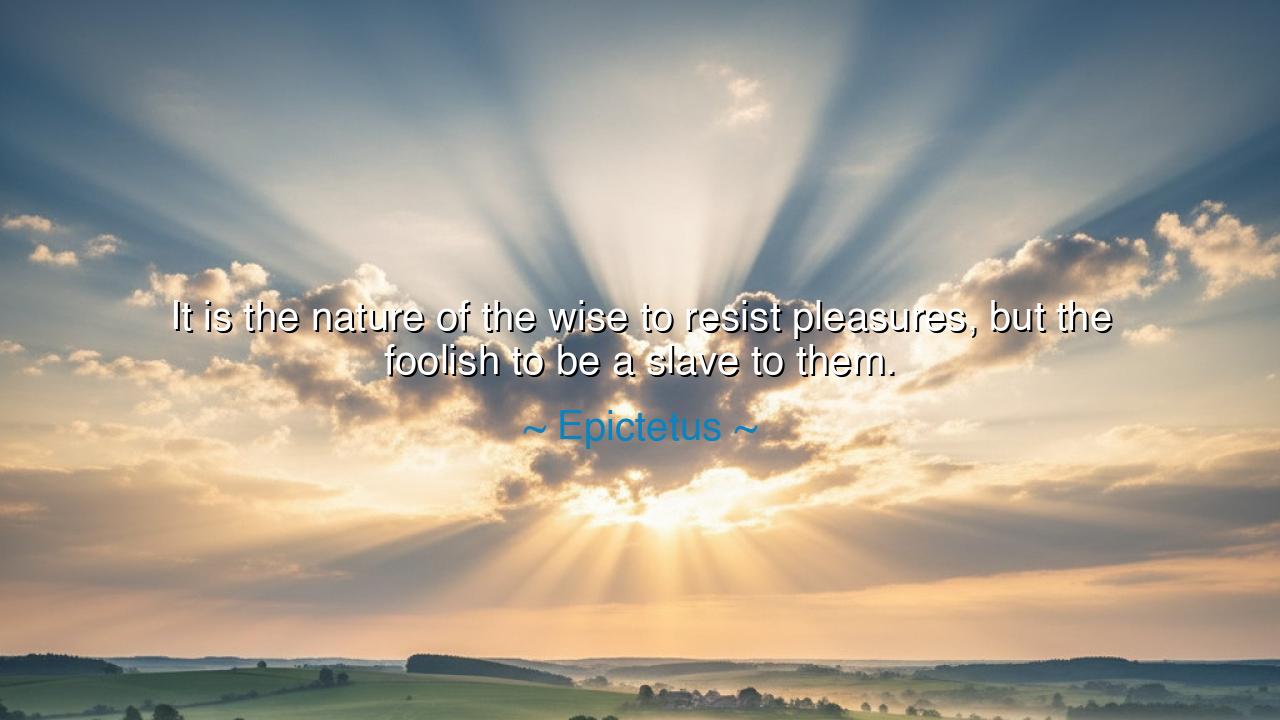
It is the nature of the wise to resist pleasures, but the
It is the nature of the wise to resist pleasures, but the foolish to be a slave to them.






The words of Epictetus—“It is the nature of the wise to resist pleasures, but the foolish to be a slave to them”—echo from the heart of Stoic philosophy like a clear trumpet in the stillness of dawn. They speak not against pleasure itself, for pleasure is a gift of life, but against the tyranny it can hold over the undisciplined soul. To the wise, pleasure is a guest, welcomed but never worshiped; to the foolish, it is a master, demanding obedience and consuming freedom. In this contrast, Epictetus reveals the battle that every person must wage within: whether to live as ruler of the self, or as captive of desire.
The origin of this teaching lies in the lived struggle of Epictetus himself, once a slave in the Roman Empire. From chains he learned that true bondage is not always of the body but of the will. A man may be free yet enslaved to appetite, lust, or vanity, while another may be bound in chains yet walk with the dignity of inner freedom. To “resist pleasures” is not to reject life’s joys, but to master them, to ensure they remain servants rather than sovereigns. Thus, his words are both a warning and a pathway to true liberty.
History provides us with sharp examples of both wisdom and folly in this regard. Consider the downfall of the Roman emperor Nero. He surrendered himself utterly to excess—gluttony, cruelty, debauchery, and the endless pursuit of pleasure. Though he sat upon the throne of Rome, he was a slave, chained not by iron but by his own insatiable desires. His reign ended in ruin, and his name became a curse. Contrast this with the life of Marcus Aurelius, a Stoic emperor who disciplined himself to rise above indulgence. Though surrounded by the wealth of an empire, he resisted its temptations, living simply, writing his meditations, and striving always for virtue. The one was devoured by pleasure; the other mastered it.
The emotional power of Epictetus’s words lies in the recognition that pleasure is seductive. It whispers softly, promising happiness, yet too often it leads to emptiness, regret, and destruction. The wise know that to chase every desire is to become fragmented, tossed about like a ship without anchor. By resisting pleasure, they preserve their freedom, their clarity, and their strength. It is not denial, but sovereignty; not asceticism for its own sake, but the guardianship of the soul.
This teaching is heroic in its demand. For it calls every person to rise against the most subtle of tyrants: their own appetites. To resist the pull of momentary delight in pursuit of lasting virtue requires courage greater than the sword. Epictetus does not flatter the listener—he warns that folly is easy, wisdom is difficult. Yet he promises that the reward of resistance is a life of inner peace, unshaken by craving, and free to pursue what is truly good.
The lesson for us today is clear: beware the chains that glitter. Modern life offers pleasures in abundance—food, entertainment, possessions, vanity. None of these are evil in themselves, but to bow before them is to surrender one’s will. To live wisely is to set boundaries, to seek balance, to master desire so that it may serve rather than enslave. As the Stoics taught, freedom lies not in the abundance of pleasures but in the power to go without them.
What, then, shall we do? Practice small acts of discipline daily: delay gratification, fast from indulgence, choose silence over noise, service over selfishness. Learn to say “no” not only to others, but to the restless craving within. Study the examples of the wise, and remember the ruins of the foolish. In this way, we may grow in strength until, like Epictetus, we can walk in dignity whether in palace or prison, free in spirit because we are not enslaved to pleasure.
Thus, Epictetus’s words stand as a timeless beacon. They remind us that the battle for freedom is fought not only against kings and tyrants, but against our own appetites. Whoever resists becomes wise and free; whoever yields becomes foolish and bound. And so the choice lies before us each day: to live as master of our desires, or as their slave.






AAdministratorAdministrator
Welcome, honored guests. Please leave a comment, we will respond soon